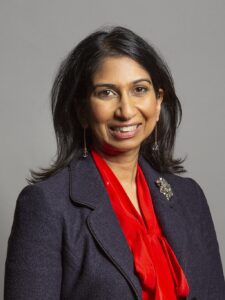Stella Braverman, the new Home Secretary, has told police chiefs to prioritise “common-sense policing” and stop focusing on “symbolic gestures”. She said the

Suella Braverman, Home Secretary
public had “a right to expect that the police get the basics right” and urged forces to focus on combating crime rather than non-criminal diversity and inclusion issues.
Stephen Watson, Greater Manchester’s new chief constable, has told his officers to avoid “woke” policing and virtue signalling, raising concerns that making common cause with campaign groups can damage fairness and impartiality and make it impossible for police to do their jobs.
I agree with Braverman and Watson. It cuts no ice with me that police shimmy at pride marches, paint their cars in LGBTQ+ colours, take the knee with Black Lives Matter or dance with environmental activists. This is window dressing, a fashionable fig leaf to mask the fact that policing has lost its way and has no real base in the communities it serves. Furthermore, it cynically promotes a hierarchy of equalities in which some social groups have influence and receive support but others, principally women and children, do not.
Females are not protected by hate crime legislation, yet they are the only social group in the UK regularly subjected to targeted hate-based violence and homicide on the basis of ‘immutable physical characteristics’. Despite increasing levels of sexual assault and domestic violence, the sexism which underpins it is largely ignored. We know police forces across the country, including our own, have a serious problem with sexism and misogyny, but, despite this, women are still asked to accept, and even repeat, the easy lie that other groups, nowadays transwomen, are subject to greater threat.
When I worked for a local domestic violence charity in the 1990s, we called it “what aboutery”. Every time we raised anything about sexual assault or violence against women, someone would say “but what about men”. It was accepted that other community groups would concentrate on the needs of their own target group, but this did not apply to us. We were silenced, even screamed at, when we asserted our claim to justice. It was a precursor of what was to come.
During the Conservative leadership campaign, Liz Truss threatened to stop funding police forces spending money on questionable training programmes. Many of these programmes have wilfully ignored the sex-based rights of women and girls, quietly excising all mention of sex as a protected characteristic under equalities law.
Such flawed training may be the reason that, in the past, local police have permitted (some feminists would say facilitated) extreme trans ideologues disrupting meetings of gender-critical women’s rights activists, most notably during past Labour Party conferences held in Brighton.
The police seem to have done better protecting gender-critical people attending the recent “Let Women Speak” meeting in Victoria Gardens, though even then, when women’s rights activists had been threatened and their speeches (including contributions from Maya Forstater, Helen Joyce and ‘Posy Parker’) disrupted by balaclava-clad trans activists, it was suggested the two sides had to be “ kept apart”, implying violence on both sides. In fact, many women’s rights supporters chose not to attend because of on-line threats and those who did remained peaceful.
There were several men in attendance peacefully supporting the sex-based rights of women. Film later emerged of two women, one apparently employed in the office of local MP Lloyd Russell Moyle, hurling obscene abuse at one of them, a father holding a small baby. No police response has been reported. But then, no police action was taken in 2017 when, not far way on the Level, Clive Lewis, a Labour MP stood on a stage in front of hundreds of people, including children, and instructed a young woman to get “on your knees bitch.” It was treated as a joke, not a hate incident.
Worryingly, Sussex Police have recently condemned a women’s rights activist for ‘misgendering’ a convicted paedophile, Sally Ann Dixon (formerly John Stephen Dixon) implying the activist may be in breach of the law and referring her to online guidance on ‘hate crime’. The activist had rightly objected to Sussex Police’s assertion that Dixon’s crimes were committed by a female perpetrator, pointing out that the thirty crimes against seven children (five girls and two boys) of which Dixon was convicted, were committed by John Dixon as a male. Dixon has no gender reassignment certificate.
Sussex Police’s tweeted response states that they “do not tolerate any hateful comments towards their gender identity regardless of crimes committed” adding “This is irrelevant to the crime that has been committed and investigated.” A further tweet stated “If you have gender critical views you wish to express this can be done on other platforms or your own page, not targeted at an individual”.
These police responses have given rise to outrage, accusations of misogyny and demands that the Stella Braverman, the Home Secretary and Katy Bourne, the Police and Crime Commissioner, take action. Others have suggested the police educate themselves on actual law, not “Stonewall lore”.
It seems clear that the days of ‘no debate’ about trans issues are well and truly over. The police had better get used to it. And get a grip.
